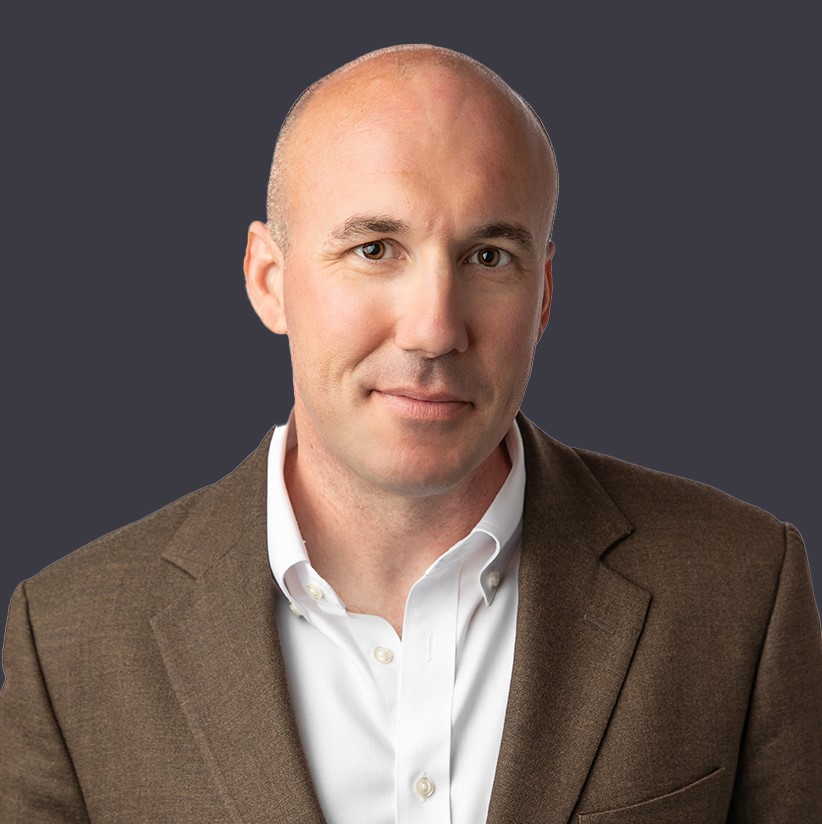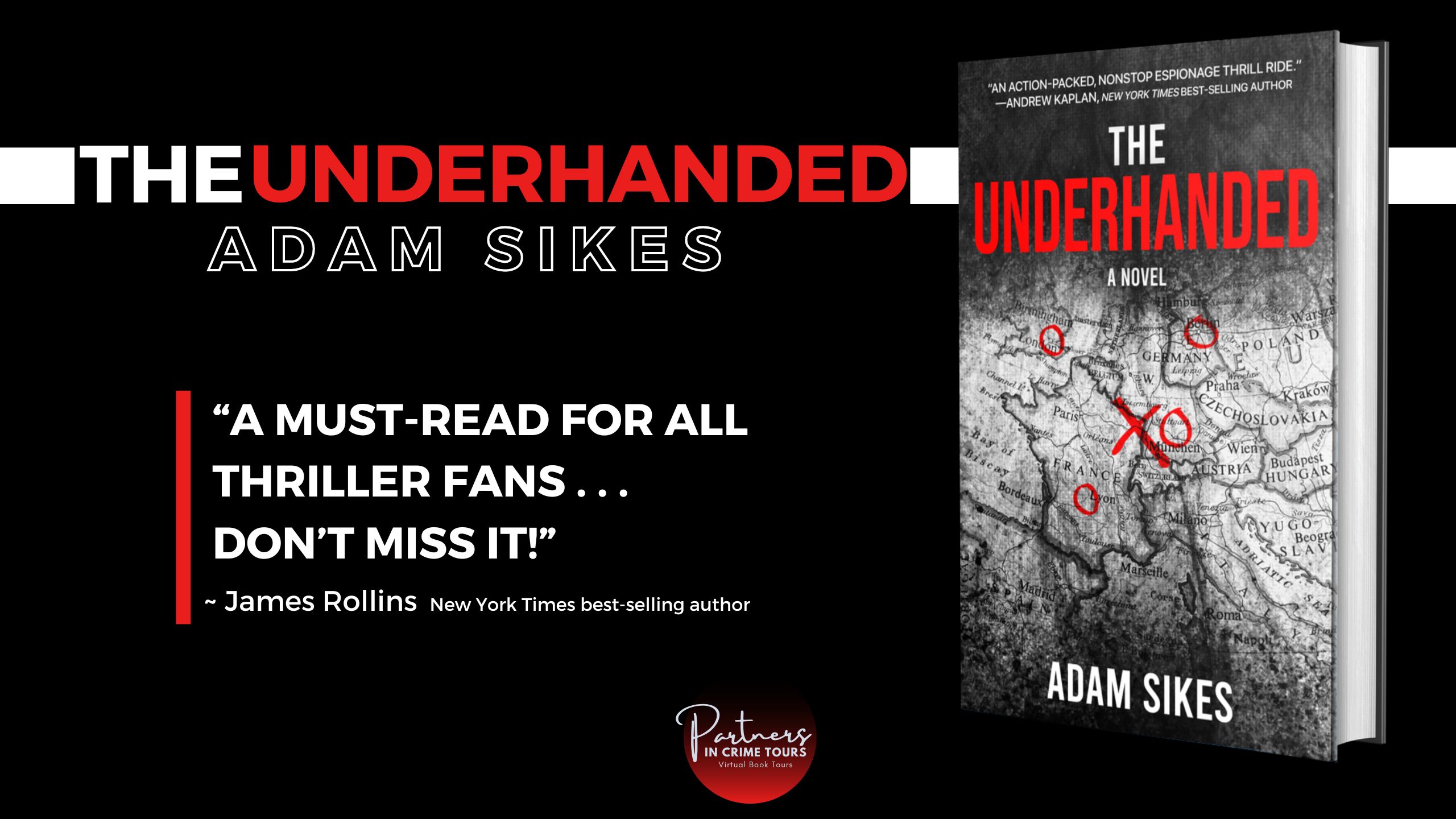THE UNDERHANDED
by Adam Sikes
April 8 - May 3, 2024 Virtual Book Tour
Synopsis:

Europe’s last line of defense against neofascism—a history professor?
Professor William Dresden has found solitude in the south of France to grapple with his troubled past—a neglected upbringing, failed romances, the recent demolition of his life’s work in academia, and even witnessing genocide, among other secrets. But he soon learns that he has much larger problems when an adrift MI6 officer, Adeline Parker, calls and insists on a meeting, revealing shocking information about his family. Then a bomb explodes.
William and Adeline narrowly escape the attempt on their lives and find themselves battling a group of neofascists and extreme nationalists who are inciting violent divisions across Europe. They are pulled into a shadowy war against a cabal called the Strasbourg Executive and pushed to the brink by family betrayals, corrupt institutions, and the Executive’s subversive plots against the fabric of Western society.
To survive, William must make tough decisions and act in ways he could’ve never previously imagined—but even that might not be enough.
Perfect for fans of Dan Brown and Jack Carr
Praise for THE UNDERHANDED:
"The latest by Adam Sikes, The Underhanded, is a ripped-from-the-headlines thriller that left me awed and at the edge of my seat. It’s a suspenseful mix of historical intrigue and present-day repercussions. It reminded me of the spy craft and nerve-rattling storytelling of Ken Follett and John le Carré. A must-read for all thriller fans . . . don’t miss it!"
~ James Rollins, New York Times best-selling author
"I couldn't put down this ripped-from-the-headlines novel from a writer who gets all the details right--in The Underhanded, Adam Sikes joins the ranks of the best names in espionage and political thrillers. As his intelligent and complex hero grapples with his past and a threat posed by a secret neo-fascist cabal, you will be rooting for him all the way to the last page."
~ Deborah Crombie, New York Times best-selling author
"Fast-paced and engaging, The Underhanded grabs you from page one and doesn’t let go! Great storytelling that weaves together rogue spies, ancient secrets, and clever
tradecraft—Adam Sikes is destined for great things!"
~ Ward Larsen, USA Today best-selling author
Book Details:
Genre: International Thriller, International Spy Thriller, Conspiracy Thriller
Published by: Oceanview Publishing
Publication Date: April 2, 2024
Number of Pages: 320
ISBN: 9781608096008 (ISBN10: 1608096009)
Series:A William Dresden Novel, 1
Book Links: Amazon | Barnes & Noble | BookShop.org | Goodreads | Oceanview Publishing
Read an excerpt:
Chapter 1
Provence, France
The unexpected vibration of my phone startled me, and I immediately regretted bringing it out here. I should have left it tucked in my jacket draped over the chair or dropped it carelessly on the kitchen counter. As it was, only a few people had this particular number, and I wasn’t expecting a call from any of them. It wasn’t that I didn’t want to hear from Phil or Gwen or Elliot or Alison—all good people whom I would call friends—but not at this moment.
I’d been enjoying my evening of quiet reflection, lost in my thoughts, mulling over what had happened and pondering what I was going to do next. I needed to do something; I couldn’t hide away forever, even if the idea was mildly appealing. I needed to get on with my life and my work, and just a few moments ago before this distraction, some acceptable ideas had started to percolate.
The phone vibrated again, rattling on the table next to me. And the caller ID showed Restricted, which made it even more bothersome, particularly now and especially here.
The south of France—with its beautiful beaches, superb wine, decadent women, and unbridled past—was where I went to escape or relax. It was a little of both this go around. Amidst the centuries-old villages, I could read, eat, flirt with socializing, and recharge. I was content here, and after a few days or weeks, I would be fortified to thrust myself into the breach and face the big bad world.
I watched the phone vibrate once more—three times now—and debated whether to let it go to voicemail. I preferred that option. It was the better option. I didn’t want to talk to anyone. Although I had my friends and colleagues and acquaintances and could attempt a front of affable charm now and again, in my truest form I was quiet, preferring the conversations in my head to those with actual human beings.
I was a historian and I preferred books to . . . well . . . just about everything. Books didn’t need anything, just to be read and understood. They embodied a conversation with the author that was codified with ink on paper, there to be surveyed and contemplated and always available. People, on the other hand, tended to be complicated and unpredictable, some exhaustingly so.
But there it went again. My phone. Four rings now.
Voicemail, I thought. If the call was important, the person would leave a message or ring back, right?
But . . .
The phone vibrated once more, the noise jarring as it clattered on the patio table, demanding attention like the obnoxious party guest who spoke too loudly for the room and who no one could avoid. I think everyone has encountered those individuals at one moment or another.
And again—it vibrated.
Dammit.
I threw back the last of my wine and snatched up the phone. “Hello?”
“Hello. Am I speaking with Professor William Dresden of Princeton University?” asked a woman’s voice I didn’t recognize. She had a British accent and a confident tone, like one accustomed to chucking authority around.
“May I ask who’s calling?” I replied.
“My name is Adeline, and I have something urgent to chat with the professor about.”
“Okay,” I replied, remaining polite but noting that she hadn’t offered a last name.
“Are you Professor Dresden?” she asked again.
“I am.”
“Good. Glad I reached you.”
“What can I do for you?”
“I’ll get right to the point. Neither of us like having our time wasted,” the woman began. “My organization needs your assistance. We’re aware that for the past few years you’ve been researching the lives of some lesser-known men from the nineteenth century. You’ve argued that they were driving forces during Europe’s imperial era, and you recently gave a talk in Washington, D.C., about them. You caused quite a bit of controversy.”
I didn’t respond but she was right. My latest research had indeed caused a pompous cabal to descend from the Ivory Tower who were intent on ripping up my life’s work. By focusing on the people that surrounded the famous personalities of the past—rather than the statesmen and generals themselves—I’d shown that the aides and deputies of history were often as influential as the principals. They worked behind the scenes, pushing here and whispering there, orchestrating events according to their own designs and those of their masters. Their obscurity was their power, and these lesser-known individuals had intrigued me for the past twenty years or so.
Sadly, in recent months, more than a few scholars—people I would call my peers—had attacked my conclusions, picking apart my research methods and analysis and even my misplaced commas. Some went so far as to call me second-rate, which I will admit hurt.
It wasn’t all that surprising, I suppose. For those who’d devoted themselves to being the renowned authority on the likes of Napoleon or Roosevelt, my analysis had called into question their life’s work. One historian from George Washington University even accused me of fabricating my research, although nothing could be further from the truth. That comment truly shocked me, something I’d not encountered before and never in all my years of academia heard leveled in front of an audience.
To say it had been an uncomfortable time would have put it too gently.
Thus, I wondered what side of the argument this woman was on and what she wanted. The prospect of thrashing out some minor point of no real consequence didn’t entice me. And in my current state, if provoked, I’d likely pop off and say something I’d regret. Being kind was one of life’s most important qualities, my dear mother had always said, and I agreed with her. But after a drink or two I could become a little edgy, which might be good or bad, depending on your perspective.
“From my own work,” the woman continued, “and in light of what you claim to have uncovered about these men, I have some documents I think you should see.”
“Is that so? May I ask what they’re about?”
“They pertain to a small group of men of the same era and caliber that you lectured on. Their actions connected.”
“Could you be more specific, please?” I asked, now thinking the woman may not have called to put me on the rack. She had another angle, though it was still unclear. Maybe she was nuts. “You said your name was Adeline, and you represent who?”
“I’d rather not say anything more on the phone. All I can tell you is that the papers have been secreted away for a long time. The information they contain, coupled with events in recent years, suggests we’re facing a revived threat to both Europe and America.”
I sat up. “What? What are you talking about?”
“This may sound bizarre, but you must believe me. What I’m referring to is highly sensitive.”
“I don’t understand. What information?”
“I shouldn’t say any more right now. I need you to trust me.”
“Trust you?”
“We shouldn’t discuss anything else. It’s too dangerous. We must meet in person.”
“Too dangerous? Who are you and how did you get this number?”
I raised out of my chair and scanned the backyard of the villa. It was sunset and the shadows were dancing underneath the Aleppo Pines that dotted the hills. I felt the hair on the back of my neck stand up and, for a reason I could not explain, I wondered if I was being watched.
“Professor Dresden, I’ve no doubt you’re aware that Europe is facing numerous concerning challenges. An immigration crisis, climate impact, a resurgence of ethno-nationalists movements, Russia hammering on the eastern door . . . We need to meet tomorrow morning. Everything will become clear once we speak.”
I didn’t know how to respond. The woman wasn’t making sense. It was as if she’d drenched me with a mass of my own personal strife threaded with societal chaos and nonsense, intending to frighten or motivate me, I couldn’t tell. All I could muster was, “Thank you for the call, Miss . . . Adeline. But I’m going to hang up now. Have a good—”
“Professor, wait. There’s more. I wanted to tell you this in person, but,” she paused. “I have information about the death of your father. It was no accident.”
I slowly sat back down, her words reverberating in my ears, my chest suddenly going hollow. My father had died over twenty years ago in a car crash outside Paris. Images of a crumpled car and emergency workers scrambling about flashed through my mind. “What are you talking about? What do you know about my father?”
“Meet me tomorrow morning at eight at Le Trastevere in Villefranche-sur Mer. It’s on the water. Do you know it?”
“Yes,” I said without thinking. It was a restaurant in a small coastal town east of Nice.
“Good. See you then.”
The line went dead, but I kept the phone to my ear and stared across the countryside at the setting sun. I lost track of time, unable to form a coherent thought. The woman—Adeline—everything she’d said was at once a blur but jostled with vivid points of intense clarity . . . painful memories.
I interlaced my fingers on top of my head and pressed my palms against my temples, trying to stop the whirls of my thoughts.
Then, like one emerging from a storm, I grasped what just happened—what she’d done.
Son of a bitch.
I’d just been cold-pitched—approached without circumstance or context, and done in a manner so as to demand subsequent contact. It was how professionals orchestrated meetings when there was no logical reason for an introduction. Except this woman had done it using fear and pain, knowing enough about me to zero in on issues no normal person would have any idea about unless I’d shared it with them.
As everything began to crystallize, I then realized it was the combination of what the woman had said that was most unsettling.
I was a European historian and, by definition, my work—my life—focused on the past, not the present. Yet she’d brought up my lecture and said something about how it was connected to Europe’s current struggles . . . good Lord.
What could she possibly have to show me? What connected my work with the problems of today?
I had no idea.
As for my father—what did she mean his death was no accident? What else could it have been?
It had been nearly two decades since I’d put the man in the ground, and it had taken another year to close the man’s affairs and move on. My father—Ambassador Karl Dresden—had been an asshole, and I had no desire to reminisce.
A clap of thunder off in the distance brought me back. I glanced at my watch and saw it was getting late.
Leaning forward, I looked at the half-empty bottle of wine on the table that I’d been working on since dinner. It was a good vintage from a local winemaker, a Rhone blend, full-bodied and earthy, but I debated switching to scotch. I needed something stronger and no longer cared if someone was lurking about. If they were going to do something, they would have already done it.
Taking one last look at the call log on my phone, I snatched up the wine bottle and my empty glass and walked back into the villa. The stone walls were cracked and weathered, and the neglected hedges had overgrown what little there was of a patio.
The place hadn’t always been like this—dilapidated and forgotten. I’d spent several summers here as a child doing what young boys do, and I and my dear Olivia had come twice a year ever since we first met. She possessed a heart-stopping smile when she gazed through the backdoor across the fields. But that was a long time ago.
I made my way across the terracotta floor of the sitting room to the sideboard and opened the bottle of Balvenie. I filled a tumbler with a treble, downed half of it, swirled my glass, and finished the rest.
Shouldn’t discuss anything else over the phone. What the hell does that mean?
I poured myself a second glass—just a double this time—ran my fingers through my hair, and dropped down on the leather sofa. I leaned back, sinking into the cushion, and squeezed the bridge of my nose. When I opened my eyes, I beheld the painting above the stone fireplace. It was a landscape by Albert Bierstadt, an original, and one of the artist’s lesser-known pieces depicting the Swiss Alps, painted in 1856. It had been in my family for years.
The interplay between light and darkness was masterful. The snowcapped mountains were brilliantly lit, and the gentle slope of a hill was lush with grass and evergreens. But there were crevices and depths that were nearly black. I had always considered those places the unknown, hiding something sinister, like a troll or an evil wizard. A child’s imagination.
I took another drink of my scotch and tossed my phone on the coffee table. I closed my eyes and tried to block out the memories that Adeline had resurrected.
***
Excerpt from THE UNDERHANDED by Adam Sikes. Copyright 2024 by Adam Sikes. Reproduced with permission from Adam Sikes. All rights reserved.
Author Bio:

Adam Sikes is a novelist, U.S. Marine Corps veteran and Silver Star recipient, and former CIA paramilitary officer who has lived and served around the world, with combat tours in the Balkans, Iraq, and elsewhere in the Middle East. He has also operated in Central Asia, East Africa, and Europe. He is the author of Landslide, and in addition to writing fiction, Adam co-authored Open Skies: My Life as Afghanistan’s First Female Pilot. The Underhanded is his latest novel. Adam holds an M.A. in Global, International, and Comparative History from Georgetown University and resides in Southern California.
Catch Up With Adam Sikes:
www.AdamSikes.com
Goodreads
BookBub - @sikesar
Instagram - @Adam_R_Sikes
Threads - @Adam_R_Sikes
Twitter/X - @Adam_R_Sikes
Facebook
Tour Participants:
Visit these other great hosts on this tour for more great reviews, interviews, guest posts, and opportunities to WIN in the giveaway!
Enter Now for Your Chance to Win!
This is a giveaway hosted by Partners in Crime Tours for Adam Sikes. See the widget for entry terms and conditions. Void where prohibited.



No comments:
Post a Comment